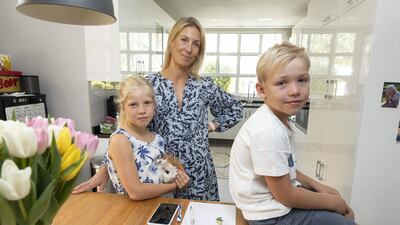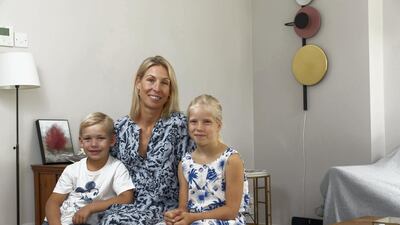Juggling remote working, distance learning and childcare has proved to be no easy task in the pandemic, with many parents suffering from emotional and physical stress.
Over the past year, working parents in particular have been at risk of parental burnout – a state of physical, mental, and emotional exhaustion.
The condition leaves people feeling chronically fatigued and can often lead to sleep and concentration problems and, in some cases, long-term mental health disorders.
To add to the burden, mothers and fathers are also adjusting – and struggling – with a lack of support systems.
The option to turn to relatives, friends and schools for help is no longer available, as many have been off-limits for months due to closures and social distancing.
Dubai resident Clara Cloché, 41, said she felt burnt out last year while trying to homeschool three children under the age of 10.
"One feeling that I felt more than any other was that I became quite distant," she told The National.
“I’m usually really hands on with my children but at that time I just wanted to shut myself off.
“It wasn’t just a case of going into another room to be alone, I even noticed while trying to do school work with my children, I’d just zone out and be distant.”
A recent study, published in Affective Science Journal, showed how cultural, rather than socio-economic factors, play a predominant role in parental burnout.
More than 100 scientists in 42 countries concluded that western countries were most affected by parental burnout due to the “individualistic culture” of people in the region.
Push for perfection piles on pressures
“Our individualistic countries cultivate a cult of performance and perfectionism,” said Prof Isabelle Roskam, co-author of the study.
“Parenthood in these countries is a very solitary activity, unlike in African countries, for example, where the entire village is involved in raising children.”
Working as a project manager, Ms Cloché, from Sweden, said so many people from her culture feel the need to “manage all on our own”, which made it more likely for things to "become too much".

“It was super hard and I was constantly having a bad conscience,” she said.
“I couldn’t sleep very well because I was always trying to figure out how to homeschool right.
“I soon realised I couldn’t be an engaged employee, mother, teacher and wife so I took a step back and just did what I could manage.
“In the end, if we got through a day where one of my children didn’t cry, that was a success.”
Home schooling a headache for parents
For mother-of-two Bernadette Ann, 53, parental burnout began during the early months of the coronavirus outbreak last year.
“My children are a bit older, 12 and 14, so I thought home schooling while working would be manageable,” she said.
“I soon realised how wrong I was."
Her youngest child had constant questions, because she was navigating something brand new, and a lot of the time the mother couldn’t answer.
“I felt guilty not being able to help, then at work my moods were decidedly different, I was snappy and quiet,” she said.
Working as a nurse practitioner, the days all seemed to roll into one, and by the weekend, Ms Ann said she had no enthusiasm to do family activities.
“That was an emotional time because I felt like I just couldn’t engage with my own family,” she said.
“I would lay in bed later than normal just for the peace and quiet.
“Speaking to other parents and hearing them feel the same made me feel a bit better and slowly but surely I started to bounce back.
“It was a really tough time.”

Tanya Dharamshi, clinical director and counselling psychologist at Priory Wellbeing Centre, Dubai said her clinic had seen an "influx of parents with Covid-19 burnout".
“They are typically balancing work with family, as well as running a home and trying to keep everything afloat, which can take its toll emotionally," she said.
“Married couples may find that their partners are often working long hours and the quality time they once had to air concerns and effectively solve problems also becomes drained, leaving them feeling burdened and isolated.”
Ms Dharamshi said many parents have complained of feeling like they are constantly switched to ‘on’ mode, and as a result have reported a number of symptoms.
Longer hours have led to irregular and disrupted sleep patterns, a poor diet often filled with carbohydrates and sugar, less exercise, more stress, and an overwhelming feeling of constantly having to prove themselves.
“For those still working from home, the boundaries between work and home lives become blurred,” she said.
"Many are now going above and beyond and working even harder than normal to demonstrate their value to their bosses as the worldwide economy struggles.
“It is the combination of all of these factors that can cause a feeling of being out of control and of not being able to cope."
She said psychological issues such as anxiety and depression can become apparent after just a few weeks, however, the longer the situation continues, the worse the symptoms will develop and the longer it will take to recover.
Telltale signs of burnout
– loss of confidence and appetite
– irritability and emotional outbursts
– sadness
– persistent physical ailments such as headaches, frequent infections and fatigue
– substance abuse, such as smoking or drinking more
– impaired judgment
– excessive and continuous worrying
– irregular sleep patterns
Tips to help overcome burnout
Acknowledge how you are feeling by listening to your warning signs. Set boundaries and learn to say ‘no’
Do activities that you want to do as well as things you have to do
Undertake at least 30 minutes of exercise per day. It releases an abundance of feel-good hormones
Find your form of relaxation and make time for it each day, such as listening to soothing music, reading or mindful meditation
Sleep and wake at the same time every day, even if your sleep pattern was disrupted. Without enough sleep condition such as stress, anxiety and depression can thrive.















